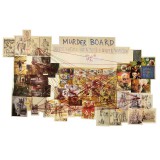Supervisor:
2020
The elements leading to the composition of the spatial installation titled Contemporary Icaruses: A mnemotechnical multisensory reading about the body are a book, an experience, a realization and a loss. The experience relates to the handling of decubitus and chronic pain, the book On Hell by Johanna Hedva is the tool used to understand this handling, the realization gets summarized in the retrieval of scattered corporeal traces through the past, while the loss concerns the declining mental and digital memory.
he spatial installation wishes to recreate a lost personal archive of projects related to the body, to place them in such a way as to facilitate a discourse between them and to modernize them in the environment of the aforementioned book. Simultaneously, it functions as a multisensory - interpretative reading for the book. It uses the art of memory to correlate ten objects - condensers of corporeal experiences that create a room. This specific room has a double function: it interprets a room from the book and, at the same time, it is one of the spaces in a memory palace.
More specifically, the installation aims to pose questions about the contemporary handling of the body and its limits, about the way with which humans intervene on it, the 'ethics' that surround all these kinds of interventions and the transcendence of moderation. The basic theme around which the installation revolves has to do with Icarus' hubris that is finally perceived as a first attempt for all the later technological- corporeal accomplishments of mankind.
